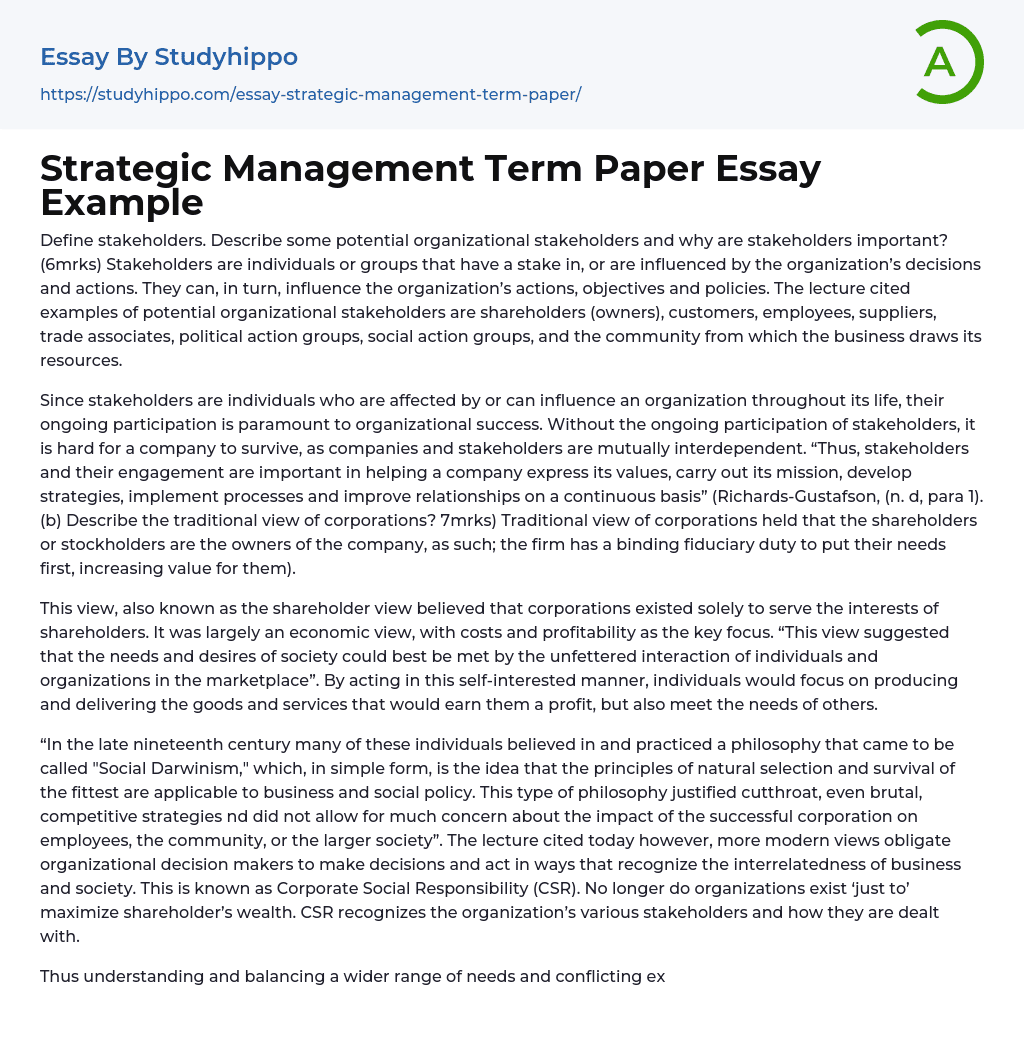Define stakeholders. Describe some potential organizational stakeholders and why are stakeholders important? (6mrks) Stakeholders are individuals or groups that have a stake in, or are influenced by the organization’s decisions and actions. They can, in turn, influence the organization’s actions, objectives and policies. The lecture cited examples of potential organizational stakeholders are shareholders (owners), customers, employees, suppliers, trade associates, political action groups, social action groups, and the community from which the business draws its resources.
Since stakeholders are individuals who are affected by or can influence an organization throughout its life, their ongoing participation is paramount to organizational success. Without the ongoing participation of stakeholders, it is hard for a company to survive, as companies and stakeholders are mutually interdependent. “Thus, stakeholders and their e
...ngagement are important in helping a company express its values, carry out its mission, develop strategies, implement processes and improve relationships on a continuous basis” (Richards-Gustafson, (n. d, para 1). (b) Describe the traditional view of corporations? 7mrks) Traditional view of corporations held that the shareholders or stockholders are the owners of the company, as such; the firm has a binding fiduciary duty to put their needs first, increasing value for them).
This view, also known as the shareholder view believed that corporations existed solely to serve the interests of shareholders. It was largely an economic view, with costs and profitability as the key focus. “This view suggested that the needs and desires of society could best be met by the unfettered interaction of individuals and organizations in the marketplace”. By acting in this self-interested manner, individuals would focus on producing and delivering the goods and services
that would earn them a profit, but also meet the needs of others.
“In the late nineteenth century many of these individuals believed in and practiced a philosophy that came to be called "Social Darwinism," which, in simple form, is the idea that the principles of natural selection and survival of the fittest are applicable to business and social policy. This type of philosophy justified cutthroat, even brutal, competitive strategies nd did not allow for much concern about the impact of the successful corporation on employees, the community, or the larger society”. The lecture cited today however, more modern views obligate organizational decision makers to make decisions and act in ways that recognize the interrelatedness of business and society. This is known as Corporate Social Responsibility (CSR). No longer do organizations exist ‘just to’ maximize shareholder’s wealth. CSR recognizes the organization’s various stakeholders and how they are dealt with.
Thus understanding and balancing a wider range of needs and conflicting expectations has become the focus. Explain the primary responsibility of managers in conducting external analysis across managerial levels. (12 mrks) The lecture cited that external analysis is the process of scanning and evaluating an organization’s external environment, using it as a source of information, a source of scarce resources or both. The environment is viewed as a source of information as environments differ in amounts of uncertainty.
Uncertainty is determined by complexity and rate of change, as such information obtained by doing an external analysis is paramount in reducing the amount of uncertainty that an organization faces. Additionally the environment is a source of scare and valuable resources that organizations depend on,
but have to compete with other organizations for). As such, strategic managers use external analysis to evaluate the threats and opportunities facing their organization, thereby creating adaptive strategies.
The lecture cited opportunities are positive external trends or changes that may help an organization improve performance, while threats are negative external trends or changes that may hinder an organization’s performance (Onywere, 2013). The lecture cited that finding valuable information and interpreting it is essential to organizational success. In smaller and medium sized companies, all employees should monitor changes in the specific industry and competitive environment.
Front line employees in small companies have the greatest interaction with customers and suppliers, such interactions provide valuable information for strategic decision makers. In larger organizations however, doing a single analysis for the entire organization can be insufficient as the large structure, with its many units and functions, creates varying needs for information. Since the value of the information will depend on the organizational level and unction, the role of different level managers will vary based on whether their role is to gather, disseminate, or utilize the information gathered.
It is not simply enough to identify the strengths, weaknesses, opportunities, and threats of a company. It is the responsibility of managers across levels to minimize or avoid both weaknesses and threats. Weaknesses should be looked at in order to convert them into strengths. Likewise, threats should be converted into opportunities. Lastly, strengths and opportunities should be matched to optimize the potential and obtain leverage for the company.
- Leadership and Management essays
- Change Management essays
- Project Management essays
- Knowledge Management essays
- Operations Management essays
- Quality Management essays
- Risk Management essays
- Scientific Management essays
- supply chain management essays
- Performance Management essays
- Time Management essays
- Brand Management essays
- Total Quality Management essays
- Risk essays
- Manager essays
- Leadership essays
- Business Ethics essays
- Board Of Directors essays
- Product Management essays
- Comparative Analysis essays
- Decision Making essays
- Dispute Resolution essays
- Stress Management essays
- Business Management essays
- Brand Equity essays
- Branding essays
- Nike, Inc. essays
- Market share essays
- Razor essays
- Being A Leader essays
- Servant Leadership essays
- Leadership Experience essays
- Leadership Qualities essays
- Incentive essays
- Accounting essays
- Andrew Carnegie essays
- Automation essays
- Business Cycle essays
- Business Intelligence essays
- Business Model essays
- Business Operations essays
- Business Software essays
- Cooperation essays
- Cooperative essays
- Corporate Social Responsibility essays
- Corporation essays
- Customer Relationship Management essays
- Family Business essays
- Franchising essays
- Harvard Business School essays




